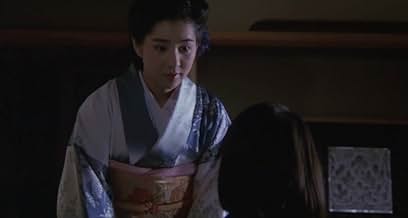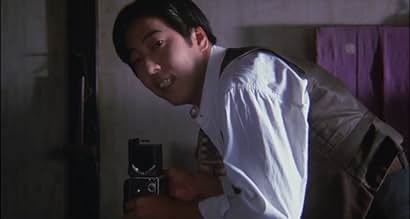CALIFICACIÓN DE IMDb
7.2/10
1.8 k
TU CALIFICACIÓN
Agrega una trama en tu idiomaThe orphaned Makioka sisters look for a husband for their third sister, Yukiko, as the rebellious youngest sister, Taeko, is kept waiting her turn.The orphaned Makioka sisters look for a husband for their third sister, Yukiko, as the rebellious youngest sister, Taeko, is kept waiting her turn.The orphaned Makioka sisters look for a husband for their third sister, Yukiko, as the rebellious youngest sister, Taeko, is kept waiting her turn.
- Dirección
- Guionistas
- Elenco
- Premios
- 5 premios ganados y 9 nominaciones en total
Yonedanji Katsura
- Okuhata
- (as Kobeichô Katsura)
Michino Yokoyama
- Itani
- (as Michiyo Yokoyama)
Opiniones destacadas
The Makioka Sisters isn't really my kind of film, owing to it mostly being about matchmaking and set some decades ago (at least on the surface; there's a little more to chew on beyond the premise). That being said, I found enough to like here.
As the title might imply, the sisters really take charge here, and it was refreshing to watch a film like this set as far back as the late 1930s (to my knowledge, a very culturally conservative time in Japan's history) have female characters with agency who took charge. Mainly, it's the two older sisters of the four looking over the two younger sisters, given they've all been orphaned, with the two older siblings sometimes butting heads while doing what's right for the younger ones. They all feel like they have something of a say over where they're going in life (I guess the older siblings more so than the younger ones, but still), and that was good to see, and I imagine inspiring.
The acting is all solid. Male characters are put in the background, but aren't just there to be mocked or ridiculed. It feels like a feminist movie in a slightly more relaxed way than this premise might be done today, and I think I respect it for that. It's all nice and real and genuine, and doesn't call attention or show off regarding how much agency it's giving its female characters; it's not just doing it to get applause or grandstand.
The film also looks nice, which I think can be said about anything Kon Ichikawa directed. Unfortunately, it is a little long, at 140 minutes. Maybe about 110 minutes would've felt like the sweet spot for me, but trying runtime aside (it's a little boring in parts), I did mostly like The Makioka Sisters.
As the title might imply, the sisters really take charge here, and it was refreshing to watch a film like this set as far back as the late 1930s (to my knowledge, a very culturally conservative time in Japan's history) have female characters with agency who took charge. Mainly, it's the two older sisters of the four looking over the two younger sisters, given they've all been orphaned, with the two older siblings sometimes butting heads while doing what's right for the younger ones. They all feel like they have something of a say over where they're going in life (I guess the older siblings more so than the younger ones, but still), and that was good to see, and I imagine inspiring.
The acting is all solid. Male characters are put in the background, but aren't just there to be mocked or ridiculed. It feels like a feminist movie in a slightly more relaxed way than this premise might be done today, and I think I respect it for that. It's all nice and real and genuine, and doesn't call attention or show off regarding how much agency it's giving its female characters; it's not just doing it to get applause or grandstand.
The film also looks nice, which I think can be said about anything Kon Ichikawa directed. Unfortunately, it is a little long, at 140 minutes. Maybe about 110 minutes would've felt like the sweet spot for me, but trying runtime aside (it's a little boring in parts), I did mostly like The Makioka Sisters.
We saw this beautiful movie several years ago at a Pacific Film Archive showing. We had read the book and found the film followed it faithfully and was gorgeously photographed. We just wish we knew if and when it will ever be made available on DVD or videotape. It was a pleasure to see a film that depicts life in nearly modern Japan with realistic people and locations. We have seen so many "studied" and arty films or medieval Japan that this one has remained a favorite ever since. We were pleased when a beautiful copy of "The Leopard" was released last year and hope that something this classic and beautiful can be made available to viewers.
I give this film 10 out of 10 as even after seeing it more than 10 times it still moves me deeply. I was 15 years old when I first saw this movie in the theater in Seattle. I went back to see it again a couple of weeks later. The first 13 minutes during the credits is my favorite scene, filmed in Kyoto in Springtime. Read the book for more background. The Kimono worn by the female actresses are amazing. The late Juzo Itami plays the father. All the dialog is spoken in "Osaka-ben" or Osaka dialect, which has a softer sound than Tokyo dialect. You can also hear some Kyoto-ben too ("gomen-yasu" said by a servant upon entering in the first scene before entering the room). This film brings me to tears it is so beautiful. At the end of the first scene, when the camera pans out to the cherry blossoms outside and the music starts...it is cinematic heaven! I am waiting for this film to come out on DVD.
The Makioka Sisters shows Ichikawa going back to one of the greatest 20th Century Japanese writers, Junichiro Tanizaki. Ichikawa had already directed, in the 1950s, a stunning adaptation of the Tanizaki novel The Key. The Key is an elliptical comedy about erotic fixation, with a lush visual style of saturated colors. The Makioka Sisters is a more subtle and delicate film, attuned as the novel was to the undercurrents running through the highly structured lives of the main characters. In some ways, the novel was Tanizaki's attempt to write a modern version of Murasaki Shikibu's Tale of Genji, and Ichikawa seems to have understood this in his adaptation, which brings a great deal of low-key humor and psychological insight to the proceedings, all very much in the Genji style. Essential viewing.
The Japanese movie entitled Sasameyuki (Light Snow) (1983) was shown in the U.S. with the title The Makioka Sisters. The film was based on a novel entitled The Makioka Sisters, so that change makes sense. The movie was co-written and directed by Kon Ichikawa.
The film takes place in the late 1930's, the years when Japan was a war with China. In retrospect, this was the start of WWII, but people didn't realize that at the time. There are some references to wartime scarcities, but this isn't a "homefront" movie.
The plot pivots on the marital status of the four sisters. Their parents are dead, and the oldest sister is responsible for the family name and the family honor. She's married, as is the second sister.
The third sister--Yukiko, portrayed by Sayuri Yoshinaga, is the shyest and most conservative of the four. The youngest sister--Taeko (Yûko Kotegawa) isn't as concerned about the strict rules of etiquette over which the others obsess. However, protocol dictates that she can't be married until Yukiko is married. So, much of the plot has to do with finding the right husband for Yukiko.
The film has colorful scenes of cherry blossoms and fall foliage. The glorious Japanese kimonos are worn by most women, and they are truly beautiful. (Because of the color and scenery, this movie would work better in a theater, but we had to make do with a DVD.)
Almost everything is serene on the surface of the film, but just under the surface there are intricate attachments and resentments. It's a long and quiet film, but it keeps your attention throughout.
For the record, Sayuri Yoshinaga (Yukiko) is one of Japan's greatest female actors. She starred in over 100 films. In my mind, she's the true star of this movie.
Some critics say that Ichikawa should be considered at the same level as the more famous Ozu, Kurosawa, and Mizoguchi. I don't have the depth of knowledge to know whether or not Ichikawa is the equal of the other three. However, after watching this movie, I know that he's a great director.
This film has an IMDb rating of 7.2, which is pretty good. I thought it was better than that, and rated it 9.
The film takes place in the late 1930's, the years when Japan was a war with China. In retrospect, this was the start of WWII, but people didn't realize that at the time. There are some references to wartime scarcities, but this isn't a "homefront" movie.
The plot pivots on the marital status of the four sisters. Their parents are dead, and the oldest sister is responsible for the family name and the family honor. She's married, as is the second sister.
The third sister--Yukiko, portrayed by Sayuri Yoshinaga, is the shyest and most conservative of the four. The youngest sister--Taeko (Yûko Kotegawa) isn't as concerned about the strict rules of etiquette over which the others obsess. However, protocol dictates that she can't be married until Yukiko is married. So, much of the plot has to do with finding the right husband for Yukiko.
The film has colorful scenes of cherry blossoms and fall foliage. The glorious Japanese kimonos are worn by most women, and they are truly beautiful. (Because of the color and scenery, this movie would work better in a theater, but we had to make do with a DVD.)
Almost everything is serene on the surface of the film, but just under the surface there are intricate attachments and resentments. It's a long and quiet film, but it keeps your attention throughout.
For the record, Sayuri Yoshinaga (Yukiko) is one of Japan's greatest female actors. She starred in over 100 films. In my mind, she's the true star of this movie.
Some critics say that Ichikawa should be considered at the same level as the more famous Ozu, Kurosawa, and Mizoguchi. I don't have the depth of knowledge to know whether or not Ichikawa is the equal of the other three. However, after watching this movie, I know that he's a great director.
This film has an IMDb rating of 7.2, which is pretty good. I thought it was better than that, and rated it 9.
¿Sabías que…?
- TriviaThe story spans the period from autumn, 1936, to April, 1941, ending about seven months before the Japanese attack on Pearl Harbor. The novel references a number of contemporary events, such as the Kobe flood of 1938, the Second Sino-Japanese War, and the growing tensions in Europe.
- ErroresTaeko is clearly wearing a strapless bra when she's in the bathtub.
- ConexionesReferenced in Nichinichi kore kôjitsu (2018)
Selecciones populares
Inicia sesión para calificar y agrega a la lista de videos para obtener recomendaciones personalizadas
- How long is The Makioka Sisters?Con tecnología de Alexa
Detalles
Contribuir a esta página
Sugiere una edición o agrega el contenido que falta

























